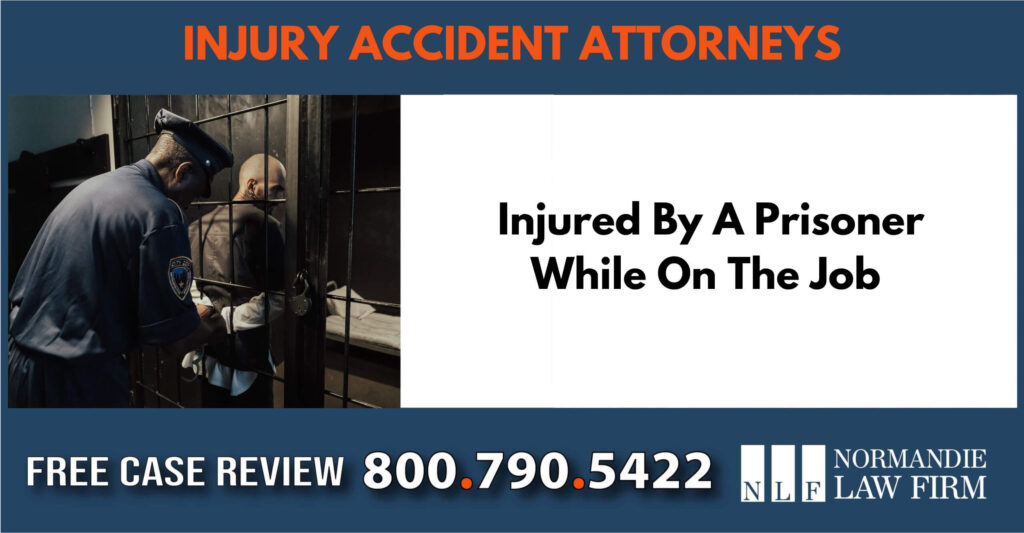The State of California Bureau of Labor Statistics reports that there are approximately 33,000 employees working as jailers and guards in the incarceration facilities located in the counties and across the state. There are more than 150 facilities at both levels that also employ administrative staff not in direct contact with prisoners and detainees on a frequent basis. If you work at a county jail or state prison facility and have been injured by a prisoner while on the job, please reach out to Normandie Law Firm. There is some vital information we want you to be aware of regarding worker’s compensation and your rights.
The list of injuries and hazards, as well as the potential for workplace injury as a jailer or prison guard, is bigger than just about any other job in the State of California. No matter what the daily role is, if you find yourself working directly with prisoners on a regular basis, your risk of serious injury, especially due to being assaulted, is more a question of when it happens, and not if. Whether the cause of the injury is related to either of those or something completely different, if you are injured by a prisoner on the job, we want you to know the professional legal staff at Normandie Law Firm is ready to take your call when you need help. Our legal team is ready to take your call, no matter what time of day it is. Our goal at Normandie Law Firm is to furnish the information and advice you need, regardless of the injury you have and how it happened. If this call doesn’t answer all of your questions about your rights and benefits under worker’s compensation, we will schedule you a free consultation with our legal professionals as soon as you have the opening in your schedule.
In that very first meeting, we will ask you to share with us the details about the incident and your injury, including details about events that took place prior to, and anything else you believe is pertinent information to the claim. We will document that info and explain to you how the worker’s compensation program in the State of California can best be used to get you back to the prison and get your bills paid. One crucial detail that you need to know when you have an on the job injury is how much time you have to get a claim filed with worker’s compensation in California.

Our Recent Verdicts and Settlements
$2.5 Million
$1.1 Million
$1.5 Million
$600,000
$525,000
$734,851
What Is The Time Limit To Get A Worker’s Compensation Claim Opened?
The standard time limit for opening a claim with the worker’s compensation program is 30 calendar days. The clock starts on the date of the injury by a prisoner while on the job. If the state or county doesn’t open a case with the program as a result of your injury, or if they try to prevent you from contacting the worker’s comp system, do not hesitate to contact the Normandie Law Firm. We will assist you in getting your claim opened before the deadline. Claims filed more than 30 days after your injury will be denied, and the time limit is strictly enforced. Also note that you are able to open a worker’s compensation claim even if you are no longer employed as a guard where you were hurt. As long as the claim is opened within the original 30 day time limit and the incident took place while you were employed by the state or county, this is supported. There are also a couple of exceptions designed to deal with injuries that do not have a single incident root cause and began longer than 30 days ago. This injury type is covered under what is called cumulative trauma.
Cumulative Trauma
Injuries that are a result of several incidents over a more extended period of time get referred to as a result of cumulative trauma. This kind of injury remains eligible for treatment under worker’s compensation beyond the 30 day limit. A potential example would be repeated injury that, over time, resulted in loss of function in a hand or foot. The time limit for any injury diagnosed from cumulative trauma is one year from the date of the first day of work you missed. Normandie Law Firm will help you get your claim filed with worker’s comp to take advantage of the benefits you are entitled to.
The Common Injuries and Hazards When Guarding Criminals
No matter what you do for a living, your risk of injury is going to have more to do with your potential hazards and dangers than anything else. If you are employed at a state prison or county jail, Normandie Law Firm wants you to know that we have decades of experience across the staff who have dealt with the types of injuries clients have suffered as a prison guard or jailer. Starting with getting caught between prisoners fighting to significant injuries, you might get caught up in a prison uprising and everything else that falls in between. What they all share in common is that in a facility at any detention level, almost any type of injury is possible. In terms of being injured by a prisoner while on the job, the most common injuries are:
- Broken or fractured bones due to physical combat, as well as trips and falls
- Sprains and ligament or muscle damage due to physical assault, and dodging attempts to restrain you
- Cuts and lacerations to your limbs and body by prison shivs
- Concussions and contusions
The common hazards all stem from the inherent risk of guarding prisoners. For instance, as a member of the team that is monitoring cameras throughout the day, your chances of eye strain or carpal tunnel are going to be the norm. The common hazards are:
- Direct assault at the hands of inmates who outnumber the guards
- Riots and protests
- Escape attempts or transportation
Are My Injuries Going To Be Covered By Worker’s Compensation?
Injuries that happen to any employee while at work should be covered by the worker’s compensation system. Some exceptions to that statement involve the behavior and actions of the employee. Should an investigation indicate the employee was engaged in a criminal act or was determined to be under the influence of alcohol or drugs, the worker’s compensation program will not cover the claim. Employers are required to participate in the worker’s comp program. The employer, under penalty, is not permitted to stop an injured employee from creating a worker’s compensation claim for an injury that happened while working.
What Are Some Of The Benefits Offered By The Worker’s Compensation Program In California?
Each employee who is covered by worker’s compensation in the State of California is eligible for injury benefits that include, but are not limited to the following:
- A total of 1 million dollars in medical care coverage for both hospital and doctor’s bills, the cost of any required medical devices like crutches, a cane, or a wheelchair, all prescription medication, physical therapy and rehabilitation, and any other medical cost incurred by you on a per incident basis
- If you cannot return to work until fully recovered from your workplace injuries, you will receive up to 66% of your regular weekly income
- If you or your doctors expect long-term limitations or some disability due to your workplace injuries, worker’s compensation offers temporary and long-term disability payments
- Every employee who is unable to return to work will be eligible for vocational training paid for by the program, which allows them to seek employment in a job role they are capable of performing after they are cleared by medical staff to return to work
Most medical care providers will bill the worker’s compensation program directly for care that is provided to an employee injured at work. You will want to make sure the claim is opened and gets approved so that this can take place. Please get in touch with our staff at Normandie Law Firm to learn more about the complete list of benefits offered under worker’s compensation and how best you can use them to get your bills paid and your lost income reimbursed.
If you suffer an injury from a prisoner while on the job as a prison guard, please get a complete medical exam to verify your injuries are quickly and correctly diagnosed and treated. It is likely that you will experience shock due to the assault or violent injuries, and you may not know the severity of your injuries, especially if you hit your head after falling, being pushed, or being hit with a blunt object.
Can I Sue The County Or State For My Injuries In The State Of California?
Generally speaking, no employee is allowed to sue their employer when they are injured at work under normal circumstances. Worker’s compensation is an exclusive remedy for injured employees hurt at work. The team at Normandie Law Firm will review this with you in more depth in that initial meeting. The employer liability level for contributing to or causing your injuries is different, however, and can be reviewed by your lawyer and the team. If there is an indication that the employer could be guilty of what is called gross negligence, then you may be able to file a lawsuit for personal injury in addition to the worker’s compensation claim and benefits. One critical note on that subject is that you are not permitted to double dip on costs that have already been reimbursed. If worker’s comp paid the medical bills, you cannot bring suit against your employer for them.
Gross negligence is defined as willful misconduct or a reckless disregard for the safety of others. If you believe this has happened or has contributed to the incident, please tell the legal team in your initial consultation. A lawsuit may be filed independent of the worker’s compensation claim.
Upfront Costs For Our Clients At Normandie Law Firm
When you have been injured by a prisoner while on the job as a prison guard or jailer, we will not ask you for any upfront legal fees before we take your case. We will only bill you after the claim or case is completed successfully. If you do not win your worker’s comp claim or if we represent you in a lawsuit and do not win your suit in court, you will not be billed at all. If you need to open a worker’s compensation claim or pursue a personal injury lawsuit, please get in touch with the legal team at Normandie Law Firm.
Other Pages on Our Website Related to This Topic
Prison Guard Injury Lawyer
Pleasant Valley State Prison Sexual Abuse and Assault Lawyer
Can I Sue if my Family Member Committed Suicide in Prison?











